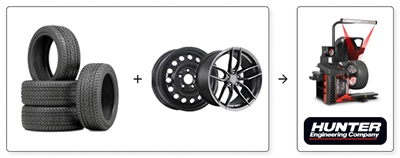Six reasons to Switch from All-Season Tires to Winter Tires

What is the difference between a winter tire and a 4 season tire?
Every year when winter comes, it’s the same thing all over again. Millions of Canadians rush to prepare their vehicle for the snow, the ice, the slush and the cold weather. Some consider winter tires to be essential to their survival. And although it has been proved that the use of tires specially designed for winter reduces the number of collision injuries, others think they’re a waste of money.
According to the Tire and Rubber Association of Canada (TRAC), only 60% use winter tires. Here are a few reasons that we hope will convince the remaining 40% to ditch their all-season tires for winter ones.
Softer Rubber Compound
At first glance, one might think that the main difference between winter and all-weather tires is the tread. In truth, it’s the rubber compound that does the most of the job. Designed to remain soft under 7 °C, it’s able to stay elastic and stick to the road, providing superior grip. On the contrary, the rubber compound with which all-season tires are made stiffens when it gets cold, causing them to slip on snow and ice-covered pavement.
Shorter Stopping Distances
In emergencies, being able to stop your vehicle quickly is crucial. With their advanced technology, today’s winter tires ensure shorter stopping distances. Experts say that below 0 °C, a vehicle equipped with all-season tires stops on a 30% longer length.
Resistance to Hydroplaning
Unlike all-season tires, winter tires are engineered to evacuate water. When pressing on ice or snow, they melt the surface layer, transforming into a film of water. With hundreds of sipes, winter tires offer more stability and channel water to the side, preventing hydroplaning.
Crisper Road Handling
All-wheel drive vehicles are great, but they are not winter-proof. They might be better at accelerating, but they’re not better at stopping. When it comes to braking, cornering and handling, you’ll be significantly safer and more confident with winter tires, no matter the number of driven wheels.
Adapted Tread
Winter tires come with deeper and more aggressive treads, specially cut into snow and slush. On the contrary, all-season tires are not designed to clear the snow and are considerably less effective in winter conditions.
To save money... really?
Many Canadian drivers who stick with all-season tires throughout the year say that winter tires are too expensive. But are they? If you switch between two sets of tires, you extend the service life of each. However, if you drive on all-season tires year-long, you will end up replacing them more often than if you had a second set. Furthermore, insurance companies offer a discount to drivers who equip their vehicle with winter tires in some provinces like Ontario.


